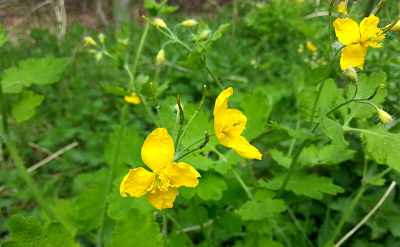 |
| Chelidonium majus (Greater Celandine, zwaluwkruid, svaleurt) |
Gedicht van Radboud, Dienaar van de Heilige Kerk te Utrecht
Over de zwaluw
Ik heb een lichaam met een zeer geschikte vorm,
waarmee ik voor geen mens op aard tot last kan zijn.
Het is immers maar nauwelijks vier vingers lang;
daaruit bestaat mijn fijngevormde lichaamsbouw.
Vandaar dat ik in kerken nestjes bouwen mag
en in de mensenhuizen voor mijn jongen zorg.
De boeren breng ik nieuwe vreugden met mijn komst,
want kwett’rend roep ik: splijt de kale grond uiteen.
En breng ik in hun huis een beetje klei bijeen,
dan geld ik - tevergeefs - als bode van geluk.
Maar de natuur schonk mij een wonderlijk geheim
waardoor ik bij mijn kroost het zicht herstellen kan;
in die kunst ben ik zelfs Pythagoras de baas,
bij wie een blinde vruchteloos genezing zoekt.
Vandaar ook dat een plant die alom welig groeit
zelfs bij de stad, zijn naam ontleent aan onze naam.
De oudste naam ervan, die vindt men in het Grieks;
‘hirundinea’ komt van zwaluw in ’t Latijn.
Ik zet u, lezer, graag mijn levenswijs uiteen
opdat u meer bewond’ring voor de schepper krijgt.
Wanneer het lover komt en wind de bloemen brengt,
dan kom ik ook en vind bij mensen onderdak.
Daar maak ik dan een nest dat iedereen kan zien
- dat speelt een luie, onbedreven hand niet klaar.
Mijn pasgeboren, lieve jongen schuilen daar,
totdat ze volgen kunnen door de wijde lucht.
Ik neem die schare mee, we slaan de vleugels uit,
en onvermoeibaar vlieg ik zo de hele dag.
En dat is niet voor niets, want zweef ik door de lucht,
dan lacht de hemel blij het dichte koren toe.
Maar raak ik met m’n vleugels ’t modderig moeras,
beuk jij het land, Aeolus, met je regenvlaag.
Verkilt daarna de zon, en komt de herfst met sneeuw,
dan drijft het vaderland me weg, of vlucht ik zelf,
bekommer me niet meer om nest of gastvrij huis,
maar volg ik instinctief mijn eigen levensweg.
In verre grotten schuil ik voor de koude wind
en geef aldus een treffend beeld van de natuur.
O mens, beschouwt u het mysterie der natuur,
waardeer dan het geschenk van uw beschaafd bestaan.
De rede heerst in u, maar ik ben redeloos.
U leeft ook na de dood, mijn leven eindigt hier.
Weest u net zo mijn meerdere in ’t volgen van
uw scheppers wet, want dat beval de schepper zelf.
Poem by Raboud, servant of the Holy Church in Utrecht
Concerning the Swallow
I have a body with a most befitting form
which cannot cause offence to anyone on earth.
Scarcely four fingers does it measure in its length;
that is my finely formed physique in full extent.
And this is why in churches I may build my nests
and in the homes of humans I may rear my young.
New joy I bring to farmers that see me return,
for chirruping I call: now plough the barren land.
And should I bring a little clay into their home
I’m deemed – in vain – as harbinger of their good luck.
A wondrous secret though did nature give to me
by means of which my brood’s bad sight I can restore;
in this art e’en Pythagoras I can surpass,
from whom a blind man seeks a cure to no avail.
That too is why a plant which grows profusely everywhere
even close to the town derives its name from ours.
Its oldest name is Chelidonium in Greek;
‘hirundinea’ is the swallow’s Latin name.
I’d like to tell you, reader of my way of life
so that your Maker even more may you amaze.
When all comes into leaf and wind brings us the flowers
then I come too and find in homes a place to dwell.
There do I build my nesting place for all to see –
something a lazy, clumsy hand cannot pull off.
My new-born darling young all have their refuge there
I take my brood with me, our wings we spread out wide,
and never tiring I then fly the whole day long.
And not for nothing, for when I fly through the air,
the heavens smile down on the densely growing corn
But if I touch the mirely marshland with my wings,
you drum the land, Aeolus, with your showers of rain.
And if the sun grows chill and autumn comes with snow,
then does my homeland banish me, or I take flight,
no longer think of nests or hospitality,
instinctively then take my chosen path through life.
In distant caves I shelter from the biting wind
and thus of nature is my image highly apt.
Mankind, consider therefore nature’s mystery,
then prize the gift of an existence so refined.
Sense reigns in you, but my own lot is senselessness.
You live too after death, my life though ends right here.
You therefore should outdo me in the following
of your creator’s law, for so did he command.
Known as the oldest poem in the Netherlands, this poem is the translation of a translation. The poem was originally written in Latin. For the whole story, (if you understand Dutch) go to here.
No comments:
Post a Comment